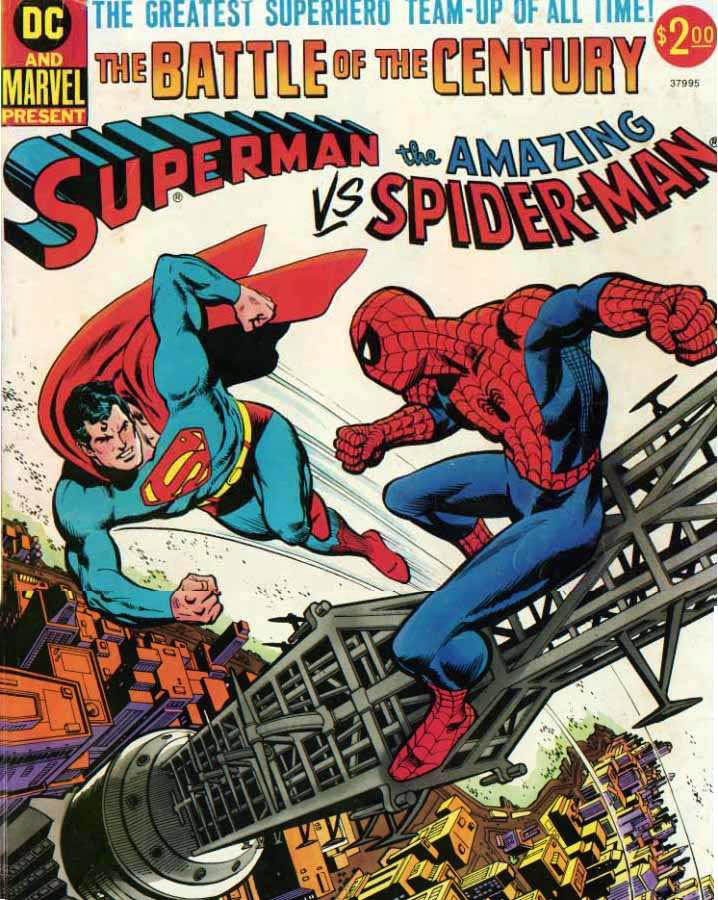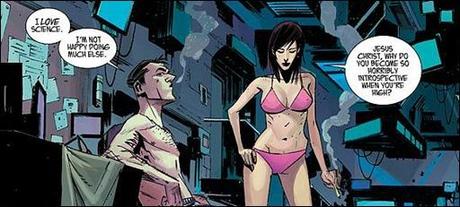Comic books movies are huge, they're mainstream. There are more comic book shows now then ever before. Jon and Jane Public know who Hydra and The Red Skull are. Hell, they now know who The Collector and Drax the Destroyer are. But I feel comic books themselves are still burdened with the stigma of being weird, childish, and immature. Even from legendary creators themselves. In spite of all that, I'm here to make the case for the importance of comic books.
[caption id="" align="aligncenter" width="397"] Case. Closed.[/caption]
Case. Closed.[/caption]
What do I mean by freeing? I mean the level of limits put on telling the story. Movies, for example must be slave to their budgets, their censorship, their market, etc. So while special effects can "do" anything, they're still highly limited by multiple factors.
Books, obviously, are the most freeing storytelling medium. You can do anything with the written word, your audience does the rest. Nothing can really compete with it, it's almost purely imagination.
So, arguably, I state that comic books are the second most freeing storytelling medium. Your only limit is drawing ability. Indeed, you rob the reader a little by illustrating the story panel to panel, but it's still more engaging a medium than movies. And this is coming from a guy who really loves movies.

This means that you get thousands of stories about thousands of things. Intimate little stories set in a single location and grand adventures set ten billion years in the future. Stories about pirates, or robots, about gods and devils, monsters, heroes, mutants, cyborgs, cops, dragons, aliens, wizards, cowboys, serial killers, and on and on into infinity. It's all up for grabs, it's all possible.
Saying "comic book" is like saying "music". There are so many genres and subgenres that's it's almost too broad a term. Unfortunately, the popularity of superheroes has tricked the public into thinking it's almost all Wolverines and Supermen, but it's oh so much more. There are comics for everyone, in nearly any genre.
Image is a great example of this. They have superhero books and scifi books, but also period dramas, sex comedies, horror, and flat out drama. All of these different stories in different universes. There are plenty of other publishers with the same kind of genre selection, vastly out-weighing the number of superhero comics.
But that's not to say superhero comics are to be ignored either. Within that genre there are many many more subgenres. Marvel and DC alone boast superhero comedies, superhero horror, gritty superheroes, kid-friendly superheroes, fantasy superheroes, sci-fi superheroes, you name it. Go outside the Big Two and find an even wider array of superhero fiction.
[caption id="" align="aligncenter" width="464"] This is also a superhero that exists[/caption]
This is also a superhero that exists[/caption]
Imagine a public as accepting of comics as they are of novels. Housewives the world over reading romance comics featuring bare-chested men holding busty women. Fans reading autobiographical comic books of their favorite idols. Teenagers pouring over sappy young adult comics. You get the idea.
The only thing holding this reality back is the stigma of comic books being for weirdos and children. A stigma created decades ago by some psychiatrist spouting mostly nonsense. We can change that. We should change that, because...
Sure, we're not at a point where comic books are read in high schools round the world, but there's nothing stopping them from reaching it.
Lets take the ever present superhero genre first. Watchmen, considered one of if not the greatest book the genre, not only deconstructs the power fantasy of superheroes, but also speaks to the absurdities of human nature, the struggles of love and relationships, the effect of power on man, the existence of morality, and the nature of sanity. It does this much in the way of Animal Farm or The Lord of the Flies. Through metaphor. Except instead of pigs and stranded boys it's giant blue gods and people in costumes. What makes those two books any more important than the comic?
The Dark Knight Returns talks to the passing of time, of tradition, and the nature of right and wrong. It also plays with fascism much in the same way as Heinlein's Starship Troopers did. More than graphic novels, regular superhero comic books have dealt with things like racism, sexism, rape, and xenophobia in elegant, thought provoking ways.

Beyond superheroes, however, there have been many comics that deal with important stories. Maus, the first comic to win a Pulitzer, is a retelling of a Holocaust survivor's experiences. Saga deals with parenthood, sex, relationships, and the destructive power of jingoism in a brutally personal way. Preacher discusses religion, family, the good and bad of Western culture, and the nature of love in hilarious, violent fashion.
These are real stories, with real impact. Stories that have stuck with people. Important stories.

Movies and TV, even radio to some extent, are hindered by the influence of corporate interests. Of advertisers and money men. You can't say the wrong thing or imply the wrong thing or represent the wrong thing. Obviously there is wiggle room for entities like HBO and, sure, movies are able to push the envelope when they want to, but for the most part they have to stay within the lines.
True, Marvel and DC are giant corporations now and must act as such. You'll never see Wolverine pull out someone's intestines in an X-Men comic (despite the fact he has knives in his hands you guys) or have Superman extol the negatives of organized religion. However, Marvel and DC are far from making up all of comics.
Avatar Press has Crossed, which is a carousel of horrible things that even HBO would take pause to show. The average story isn't limited to a TV or movie rating and has more freedom to show whatever best fits the story. Obviously it doesn't mean that every comic goes completely crazy all the time, but it means they don't have to reign it all the way back in either.
[caption id="" align="aligncenter" width="512"] This may be a bad example[/caption]
This may be a bad example[/caption]